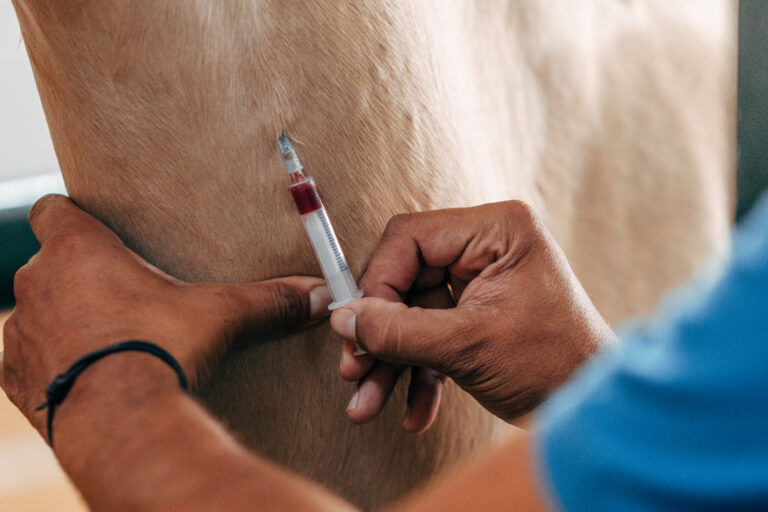Results from a research trial evaluating the effects of SUCCEED Digestive Conditioning Program, a nutritional supplement for horses, on gastric ulcer severity were presented at the American College of Veterinary Internal Medicine (ACVIM) Forum, June 6, 2014, in Nashville, Tennessee. The oral presentation, “The effect of a dietary supplement (SUCCEED) on gastric ulcer severity,” was delivered by the principal researcher, Nicola Kerbyson, BVMS, Cert AVP (EM), MRCVS, a PhD student at the University of Glasgow (Scotland).
Kerbyson’s presentation at the ACVIM Forum was drawn from a 90-day Irish research trial completed in January under the supervision of Derek Knottenbelt, OBE, BVM&S, DipECEIM, MRCVS, and Tim Parkin, PhD, DipECVPH, MRCVS. Knottenbelt is Professor of Equine Medicine at the University of Liverpool (UK) and Clinical Consultant at the Weipers Centre Equine Hospital at the University of Glasgow. Parkin is Senior Research Fellow with the School of Veterinary Medicine, University of Glasgow.
In her oral presentation, Kerbyson explained that the study of 67 active Thoroughbred racehorses was designed “to assess the effects of a dietary supplement (SUCCEED) on the development and treatment of squamous gastric ulceration….” The study included two treatment groups. One treatment group was fed the SUCCEED supplement daily, according to label instructions. The second group was administered omeprazole, a proton pump inhibitor, following label instructions. Results showed no statistically significant improvement in the severity of squamous ulceration with treatment at label dosages for either omeprazole or SUCCEED for the 90-day period. Horses in the omeprazole group were removed from treatment for up to five days prior to racing, following standard withdrawal periods as required by the British Horseracing Authority.
The equine stomach is generally divided into two sections–the proximal one-third is the squamous (or non-glandular) portion and the distal two-thirds is the glandular portion. The lower glandular portion is responsible for the secretion of mucus, hydrochloric acid (HCl) and pepsinogen. To protect the stomach wall from the caustic effects of the omnipresent acid, the glandular portion is protected by a thick mucosal layer. The squamous portion is generally more susceptible to ulceration, likely due to the lack of protective and buffering function here.
Results of this trial will also be presented at the Equine Colic Research Symposium hosted by the British Equine Veterinary Association (BEVA) in Dublin, Ireland, July 8-10 and at the 60th AAEP Convention in Salt Lake City, Utah, December 6-10.
SUCCEED Digestive Conditioning Program (DCP) is a daily nutritive supplement program designed to support the healthy structure and function of the equine digestive system. For more information visit www.succeed-equine.com.
SUCCEED is produced by Freedom Health LLC of Aurora, Ohio. The company is focused on finding, perfecting and delivering superior, innovative products that address real and significant health-related issues for animals and the people who care for them.








